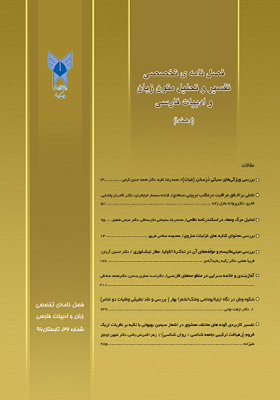تاملی بر اخلاق مراقبت در مکتب تربیتی سعدی
محورهای موضوعی : متون زبان و ادبیات فارسیفتانه سمسار خیابانیان 1 , کامران پاشایی فخری 2 , پروانه عادل زاده 3
1 - مدرس دانشگاه
2 - عضو هیئت علمی دانشگاه آزاد تبریز
3 - عضو هیئت مدیره دانشگاه آزاد اسلامی تبریز
کلید واژه:
چکیده مقاله :
سعدی در عرصة نظم و نثر جزو کسانی است که به بُعد اخلاق توجه ویژه ای داشته است. مضمون بوستان سعدی، که اولین اثر مدون وی و جزو شاهکارهای بی رقیب شعر فارسی است، اخلاق و تربیت و سیاست و اجتماعیات می باشد که در ده باب گردآوری شده است. گلستان نیز گرچه هشت باب مختلف و یک مقدمه دارد اما، مضمون اصلی تمام باب های آن اخلاق است و نکته برجسته این آثار حکایاتی است که همه، انسان بااخلاق را با زبانی نرم و دلنشین برای مخاطب می شناساند. سعدی توانسته است اثری کاملاً شخصی در بهترین سنت رساله های اخلاقی فارسی پدید آورد. نکته حایز اهمیتی که در مداقه این آثار به دست می آید، عبارت است از نقش موثر توام عقل و احساس در اجرای اصول اخلاقی در جامعه که بیانگر هدف غایی سعدی می باشد چراکه، هدف او شناساندن اصول اخلاقی برای مردم نیست بلکه، جاری ساختن اخلاق متعهدانه در روح تک تک افراد جامعه می باشد که برای نیل به این مقصود اخلاق سنتی و اخلاق مراقبت در کنار هم و با هدایتگری نبوغ حکیم نواندیش ایفای نقش می کنند. در این مقال سعی بر آن است روش کاربرد توام عقل و عاطفه را از دیدگاه تربیتی سعدی واخلاق مراقبت را عیان تر طرح نماییم.
As beginning to know himself, human being felt an urgent need providing his psychological security whose presence brought security both for him and for those with him. This need associated with human spirit cannot be something other than ethics/morality. Since bearing a concealed esteem in nature, moral laws always carry enforcement which has caused the ethics to be in a level and dignity beyond a nation's movements and historical development. Within the limit of these morals, each culture and community defines and establishes itself. Undoubtedly, the key to the development of each nation's culture is the eternity of these ethics. Recognizing both human and morality in addition to the obligatory presence and enforcement of ethics in communities, Sae'di has accurately and deliberately found out that human spirit owns delicacy to fertilize moral individualities which demands some skills. Such skills are in a way that an overview on ethics should be avoided, which does not mean inclusion of morality for a special group in a community but considering the circumstance of each community, ethics should be defined in a way to be enforced every time and place. This issue, by nature, resembles a debate raised by psychologists as ethics of care in the 19th and 20th. The only difference between them is that the former one does exclude the latter one's extremism.
1-Robinson, Fiona, (1997). Globalizing Care, Ethics, Feminist Theory, and International Relations, in: Alternatives: Global, Local, Political, Vol. 22, No. 1, Published by: Sage Publicrations, Inc. Article Stable URL: http://www.jstor.org/stable/40644882
_||_
